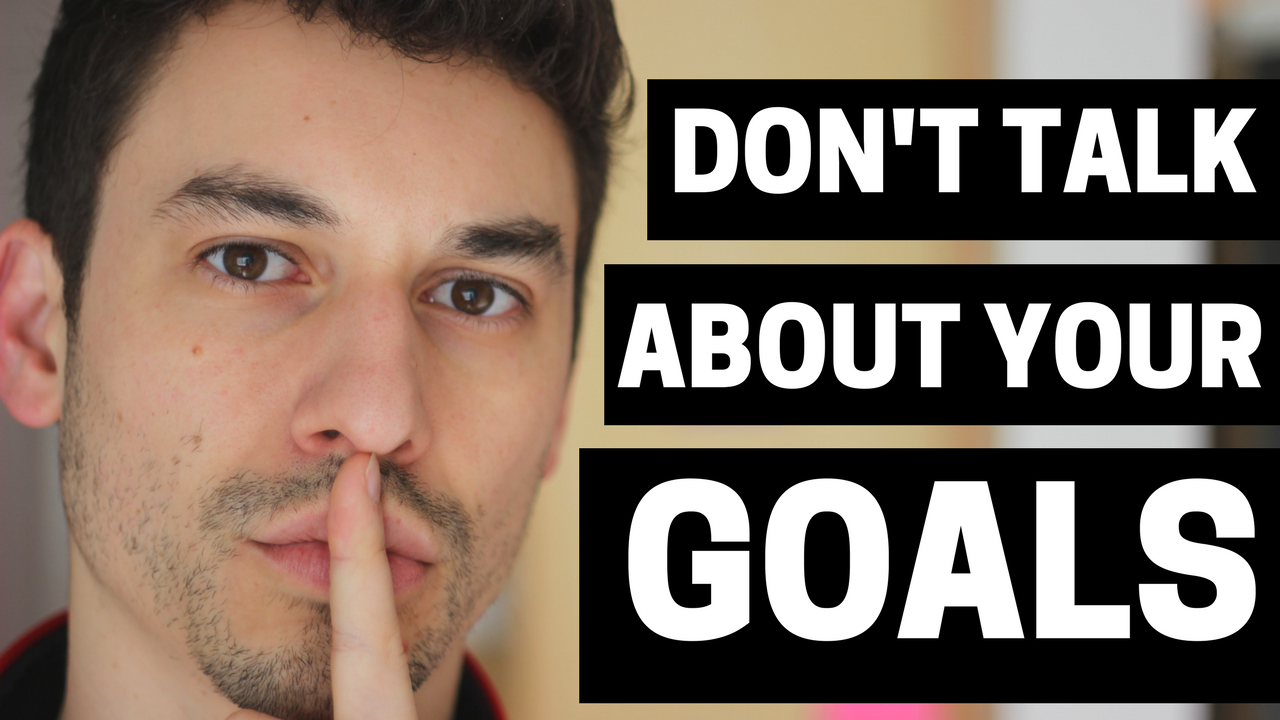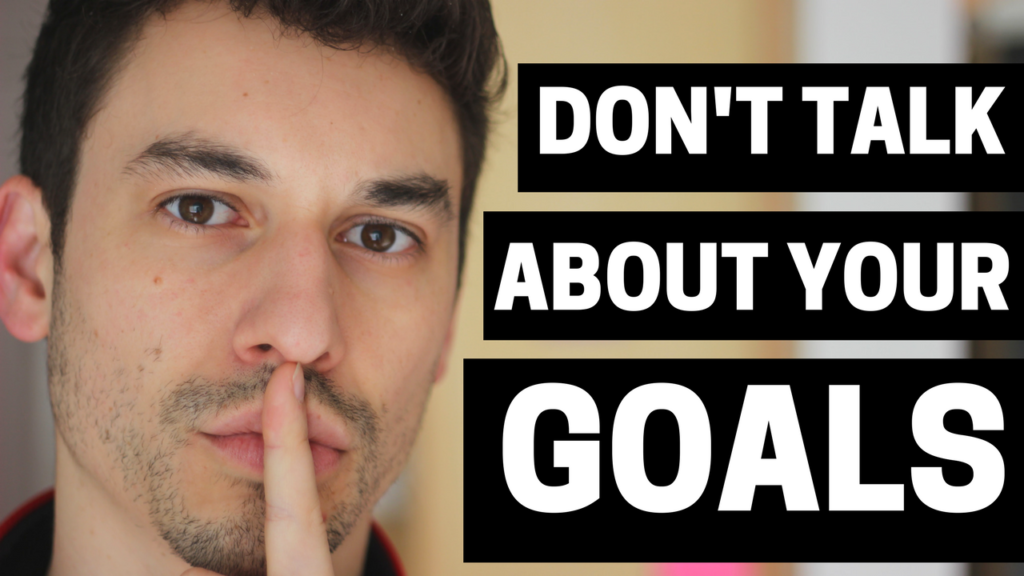
Why You Shouldn’t Talk About Your Fitness Goals

This year is going to be the year it all changes.
You’re going to lose 20 pounds.
You’re going to start saving money.
You’re going to finally take that trip to Europe.
Time to start telling the world.
Please don’t do that.
Chances are, if you start talking about your goals, there’s a very subtle set of reasons why you won’t achieve them.
Talking About Your Goals Causes an Identity Shift
In a 2009 issue of Psychological Science, Peter Gollwitzer et al published some interesting findings.
One study was done where the participants were students interested in becoming psychologists. As part of the experiment, they were forced to list two activities that they would perform in the next week to help them achieve that goal.
Half of the people handed their answers to the experimenter, who read it over and essentially said, “Okay, I acknowledged reading what you just wrote.”
The other half of the people were told that the exercise of writing down their intention was actually given to them incorrectly. It was an error, and nobody would look at it.
The following week, all the people were contacted again, and they were asked to remember the goals they had written down the previous week. Then, they were asked to write down how much time they actually spent on those activities.
The people whose goals were read by the experimenter actually spent less time pursuing those activities than the people whose goals were not actually read. Think about that.
You would think with the acknowledgment, they would be more likely to act. However, the reverse happened.
The researchers here postulated that the very act of sharing your goals leads to that feeling of an identity shift. It’s the identity shift that’s associated with becoming the new kind of person you want to be, e.g. the person who has achieved your goals.
But if we share the new identity, and we haven’t done anything yet, we’re getting that feeling of satisfaction of having completed a goal without ever having done anything.
The irony was that the “I did it!” response was triggered just by sharing – before anyone had really done anything.
It Crushes Your Inner Nuclear-Reactor

Sharing your goals with people often crushes what I call “your inner nuclear reactor.” One of the things that I’ve come to realize is that the most important thing for achieving your goals, is the engine behind it: you.
You can call it the invisible. You can call it motivation. You can call it discipline.
But the bottom line is that what predicts whether or not you will succeed is the engine behind you. This is that idea of betting on the jockey, and not betting on the horse, in the race.
One of my coaching clients had finally gotten through all the mental junk, and he was ready to blow it up in his life. He was ready to lose those twenty-five pounds, begin writing the book he always wanted to write, and maybe even start a side business.
He was all amped up, and jazzed, and ready to go. But what was the first thing he did?
He started telling his mom, and his friends, and his family.
Well, guess what they said?
“You? Lose 20 pounds? I’ve heard you say that for eight years. I’ll believe it when I see it.”
His mom said,
“Start a business? That’s stupid. That’s risky. You just have a website…keep your job, okay?”
On, and on, this refrain went from all the people around him. At the end of the day, they just took the wind out of his sails.
If he had kept those things to himself, nurtured that little seed—that inner nuclear reactor—he could’ve maintained the strength, motivation, and momentum to actually keep going.
The One Person You Should Talk About Your Goals To
… Your invisible friend?
Nope.
Yourself – and here’s why.
One study was done comparing a few groups of soccer players, in particular, to test a few different interventions on shooting goals:
- A. Self-talk
- B. Goal setting
- C. Self-talk + goal setting
- D. Do your best
When the players tried one of these interventions, the self-talk + goal setting group performed the best. I’ve talked a bit here about affirmations and my personal experience with them, but at the end of the day, why not have as many factors going for you as possible?
What All The Greats Have in Common

There’s a saying by Napoleon Hill that goes, “Tell the world what you intend to do, but show it first.” So if you’re all excited about changing your life, if you shouldn’t share your goals with people, what should you do?
The biggest thing that I found is to change your inner narrative, which often is your self-identity. For example, a person that identifies as a non-smoker, or a non-soda drinker, will never smoke and will never drink soda.
That’s because their inner belief about their identity, who they think they are, and who they are, will align and create the external. This is the whole Dr. Maxwell Maltz, Psycho-Cybernetics philosophy.
Ultimately, the way to figure out what you should be doing to reach your goals is something that I call the genius self-exercise.
It really is as simple as trying to figure out what the fit version of myself does in terms of daily habits.
What does the successful version of myself do, every single day, in terms of his daily habits?
What is the “person in a great relationship” doing every day with his habits?
What does the wealthier version of myself do that has money saved?
What would my daily habits look like then?
Often, you’ll find that you already have the answers inside yourself to living the life you want. You’ll also realize that once you figure out the little things you have to do every day, it’s just a matter of time before you make it a reality.

I know you’re excited and jazzed up. And you want to show everybody that you can do it to prove them wrong.
And I know that even more than that, you really want this year to be different.
But you’re better off proving yourself right, and doing it the invisible way first. Consult your inner genius, change your self-identity, be quiet, cultivate your daily habits, and show them what you’ve done by doing the work.
-Alex

Love this Alex, always a font of useful insights thank you! This helps me understand and tailor my work with my clients better and tailor my own inner dialogue/narrative 😀
Very happy it helped Helen 🙂
Hi Alex,
I am 26 years old.
I am being put down by a lot of friends when I tried to put my ideologies forward.
I am told “Don’t act too smart and preach us about life” . And now most of them hate me.
What Do I do to make my thoughts reach people for their own good.
Awaiting reply.
Regards,
Rashmi.
Hey Rashmi,
For these goals, sometimes it’s useful to keep a “win” book – where you write all your wins, rather than talk to your friends about. Sometimes other people are more intimidated by your goals than you might imagine.
Thank You Alex…. 🙂
You’re welcome Madhu